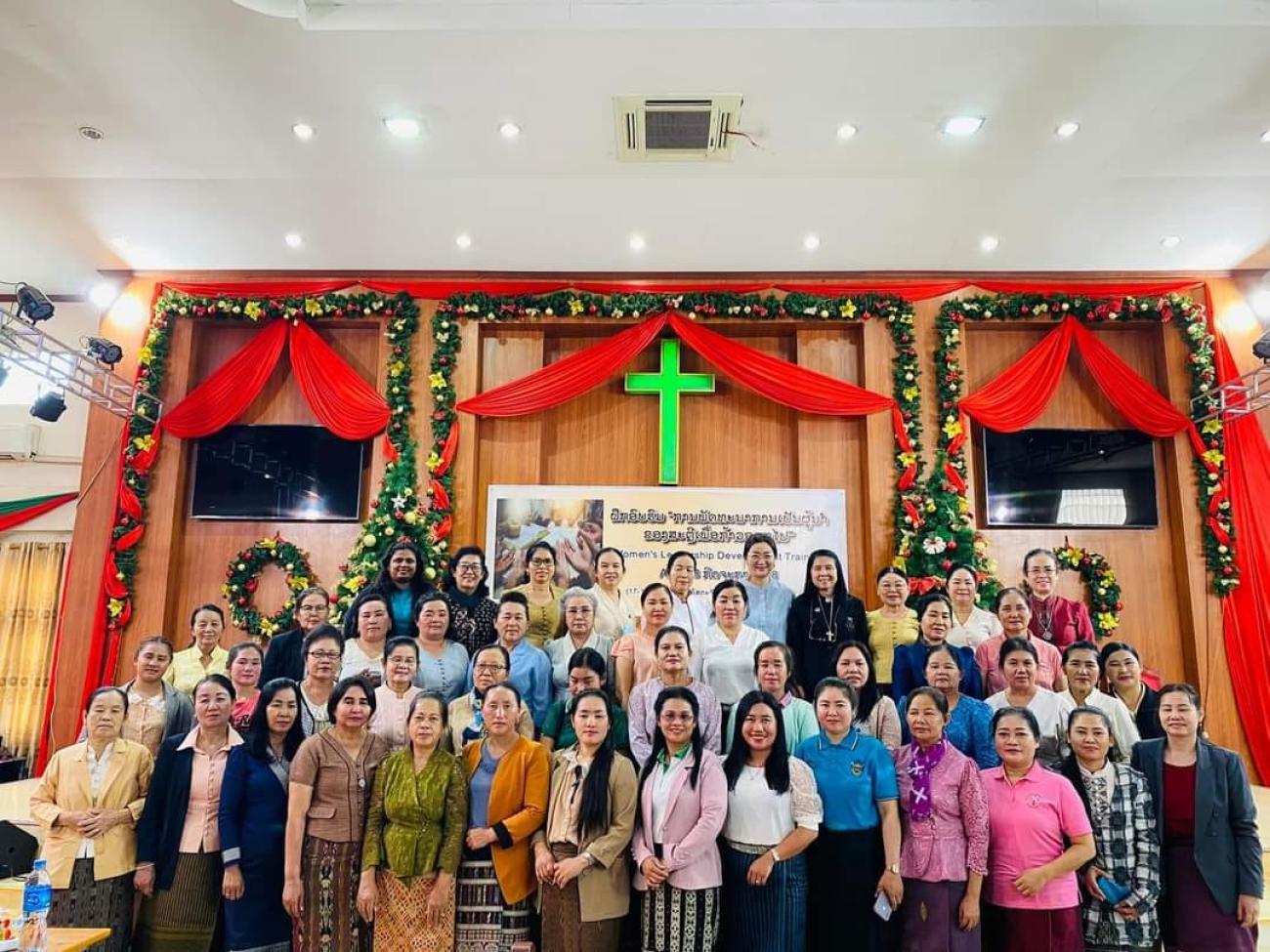CCA organises national women’s leadership development training in Laos

Participants of CCA's Women's Leadership Development Training in Laos–2023
Sabaidee! Hallelujah!” was the collective voice of greetings by about fifty women leaders from eight provinces of the Lao Democratic People’s Republic (Laos) who gathered at the Nakham Church in the capital city, Vientiane. They greeted each other with joy and excitement after a long period of disconnection since the outbreak of the COVID-19 pandemic. The women had gathered for a national-level training programme organised by the Christian Conference of Asia (CCA) in conjunction with the Lao Evangelical Church (LEC) at the Nakham Church, Vientiane, from 16–19 January 2023. The training was organised under the CCA’s Ecumenical Women’s Action against Violence (EWAAV) programme. “We are again brought together by the power of the Holy Spirit and obliged to witness Jesus in all the corners of Laos,” stated Rev. Maneewan, President of the Women’s Association of the Lao Evangelical Church. Rev. Jung Eun (Grace) Moon from the CCA led a session on the importance of women's leadership in the church and society and their increased involvement in churches’ mission. While reflecting on the story of the Samaritan woman at the well, Rev. Moon said, “Although we meet many women in the Bible who were nameless, voiceless, weak, and marginalized, and even though many of them were wounded and lived in pain, anger, loneliness, shame, and zero self-esteem, their encounter with Jesus changed them into new beings. The stories of women in the Bible who encountered Jesus in the middle of their agonies and sufferings show us how to be renewed as new beings in the love and grace of God. We are not weak but we are strong; as the Bible says, ‘strength is her clothing’ (Proverbs 31:25). Thus, develop your capacities and keep going with your passion and vision.” Adjarn Willai, the vice-director of the Church of Christ in Thailand (CCT) Women’s Association, in a Biblical reflection stressed the importance of stewardship to keep and sustain the beauty of God’s creation. Rev. Dr Sirirat Pusurinkham, former President of CCT’s Women Association, encouraged the participants to strengthen their capacities as leaders and begin with lessons from the Bible in doing mission with their God-given talents for families, children, friends, churches, and community members. Adjarn Thappyavone shared the LEC women’s involvement in ‘mission and evangelism movement’ in Laos and how the women’s contribution to the ministry had fruitful outcomes. “Our faith urges us to raise our voice and stretch out our helping arms to our sisters in our villages. Witnessing the Gospel does not require big talk. Caring for others could move them to feel the warmth of Jesus’ love,” said the church leader. Sharing the status of women and gender issues in Laos, Siamphone, one of the younger participants, commented that Lao women worked harder than men, especially in the rural regions, and had the double burden of housework and farming. Despite the reliance on their labour in and outside the house, they did not have any voice in the family. “As women, we feel powerless and have no confidence in ourselves. But this training has made us learn and accept ourselves as blessed to be women and enjoy our being together,” she said. Kimphone Lovan shared that some tribal women were not acknowledged as citizens of Laos and there were many taboos on some minor tribals and more discrimination against tribal women. “Very often we underestimate our capacity as leaders and our faith in Jesus encourages us to perform our leadership in better ways with stronger confidence in ourselves. We are happy to be part of this training which provides good tools to develop our leadership capacities,” added Ms Lovan. Lao Evangelical Church is the only CCA member church in the country and the only officially recognised protestant church. The LEC is the fastest-growing Christian church in Laos with over one thousand congregations. Although the LEC is one of the newly growing Christian churches in Asia, the church is sending its missionaries and mission teams to neighbouring nations like Vietnam, Myanmar, and Thailand to witness the Gospel. It is estimated that approximately 30 percent of total LEC members are women. The women's leadership development training with LEC was conducted to strengthen women's leadership and their capacities while enhancing their biblical-theological understanding and ecumenical perspectives, which will extend their ministries in serving their communities.











